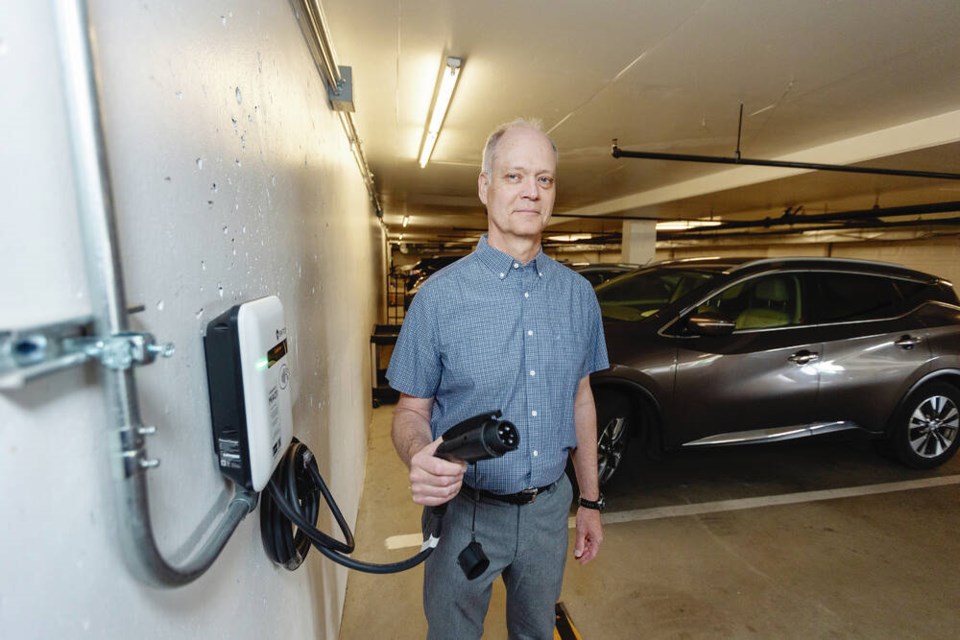A provincial program that offered rebates for the installation of electric vehicle chargers in single family homes and creation of a transition plan for electrification in multi-unit residential buildings and workplaces has been suspended due to its popularity, leaving hundreds in the lurch.
The EV Charger Rebate Program, which began in 2019 and was given additional funding in the 2022 B.C. budget, had a budget of $14 million over two years. The federal government contributed $5 million towards the program, which was administered by B.C. Hydro and Fortis in the capital region.
According to the Ministry of Energy, Mines and Low Carbon Innovation, which funded the CleanBC Go Electric vehicle charger rebate program, both the single-home rebate program and the EV-Ready Plan, which covered apartments and condos, were more popular than anticipated and the programs were oversubscribed.
Applications stopped being accepted for the program on Thursday, leaving some applicants unsure if their projects will receive the rebates. A $5,000 rebate per charging station for multi-unit residential buildings and workplaces remains.
Lee MacFarlane, EV Division manager at Edwards Electric, a Saanichton-based electrical company, said the firm has helped more than 200 stratas navigate the process since the program began and facilitated the allocation of close to $1 million in funding.
“We are actively working with stratas and are in different stages of the process of signing agreements to move forward with EV Infrastructure or EV charger installations,” said MacFarlane. “All these stratas have followed the program as per the government’s instructions and they have been doing this in some cases up to three years to this point.”
In the week since the announcement of the program’s closing, the stratas he has been working with have rushed to submit their applications for pre-approval on just over $500,000 in rebates.
“We do not know if they will receive the pre-approval, or if some stratas will be lucky and some will not be lucky,” he said.
Under the just-cancelled program, stratas could be eligible for three rebates — up to $3,000 for the creation of an “EV Ready plan,” a strategy to make at least one parking space per residential unit EV ready; up to 50 per cent of costs to install the electrical infrastructure required to implement the plan, to a maximum of $600 per parking space and a project maximum of $120,000; and a rebate of up to $1,400 to purchase and install Level 2 networked EV chargers, to a maximum of $14,000.
Applicants were given the choice of applying for the rebates together or one at a time as the project progressed.
Some municipalities also sweetened the deal with their own rebates in conjunction with the provincial offering. The District of Saanich offers a $1,000 top-up for the EV Ready plan and an extra $100 per parking stall for plans in the municipality.
MacFarlane said the process was long and arduous. His company has a team of four employees that spend up to 160 hours per week managing 40 clients at various points of the process — and that doesn’t include the actual work of installing any EV charging equipment or infrastructure.
Jim Church, who lives in a strata complex in Cordova Bay, can attest to the time it takes to bring a project to completion and the complexity of the process. “It took us about 15 months to completion, and we are a small strata with 29 owners who voted for it unanimously,” he said.
After an article about how his building became the first multi-unit complex in the region to be retrofitted with EV chargers appeared in the Times Colonist in October 2021, Church said he received close to 180 enquiries from other interested strata corporations. His strata was one of the first to successfully apply for the rebates.
All of the 32 parking stalls in his complex now have an energized outlet. Of those, 10 owners chose to install Level 2 chargers, even though only three residents owned an electric vehicle.
“Although not every owner had an electric vehicle — or even plan to buy one — we all recognized that having it was important for land values,” said Church, who heard of a sale on a condo collapsing because the property lacked a charging port for the buyer’s electric vehicle. “I believe it can add $10,000 to $15,000 to the value of a condo.”
The Ministry of Energy, Mines and Low Carbon Innovation has indicated that a $5,000 rebate for chargers in apartments, condos and workplace will continue, with funding support from the federal government’s Zero Emission Vehicle Infrastructure Program. The rebate offered by that program will be up to a maximum of $5,000 per Level 2 charger (up to 50 per cent of costs).
While some of the same items are covered under both programs, MacFarlane praised the just-cancelled program for its holistic approach, and was critical of the new program’s “piecemeal” approach. It is also missing key elements, such as reimbursement for a system plan or design for condominiums and other multi-unit buildings, he said.
“Comparing the two programs is like comparing apples to oranges.”



